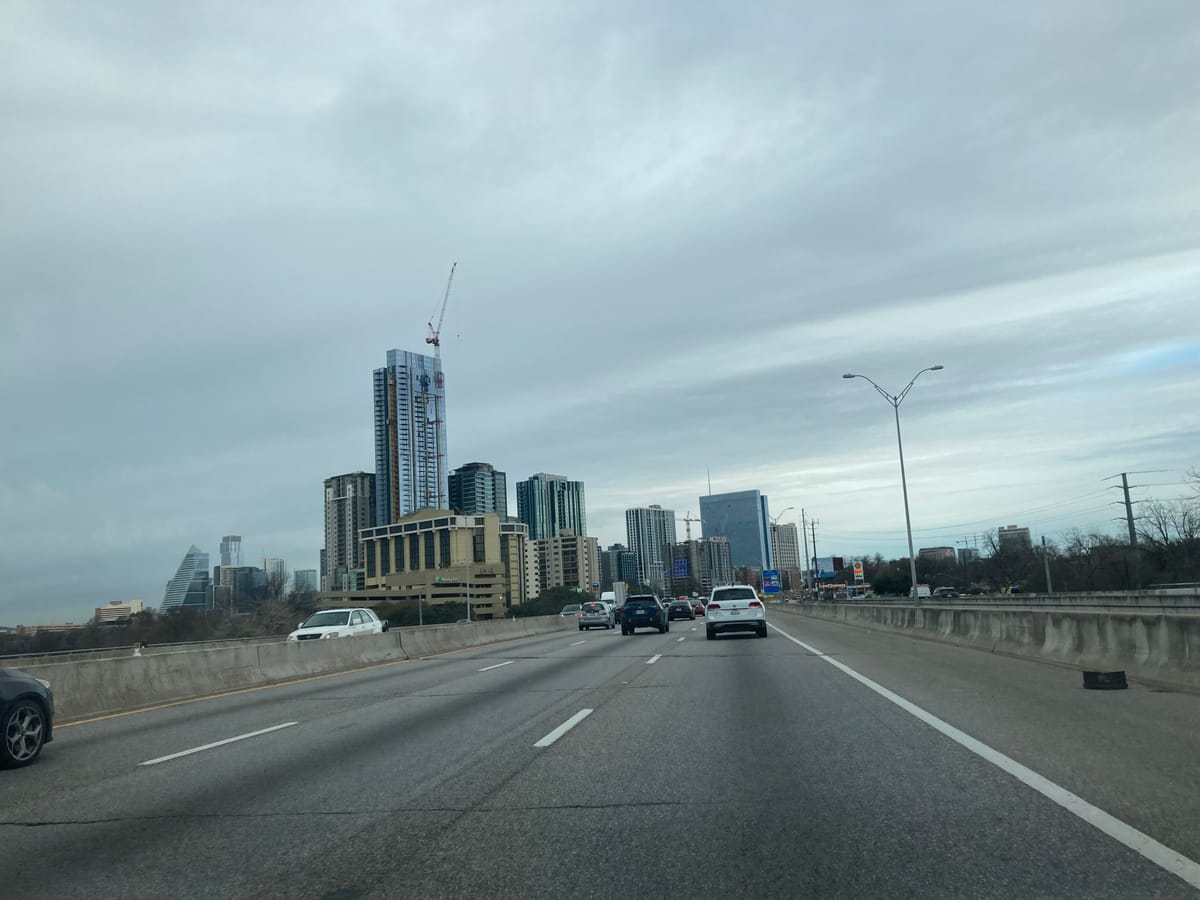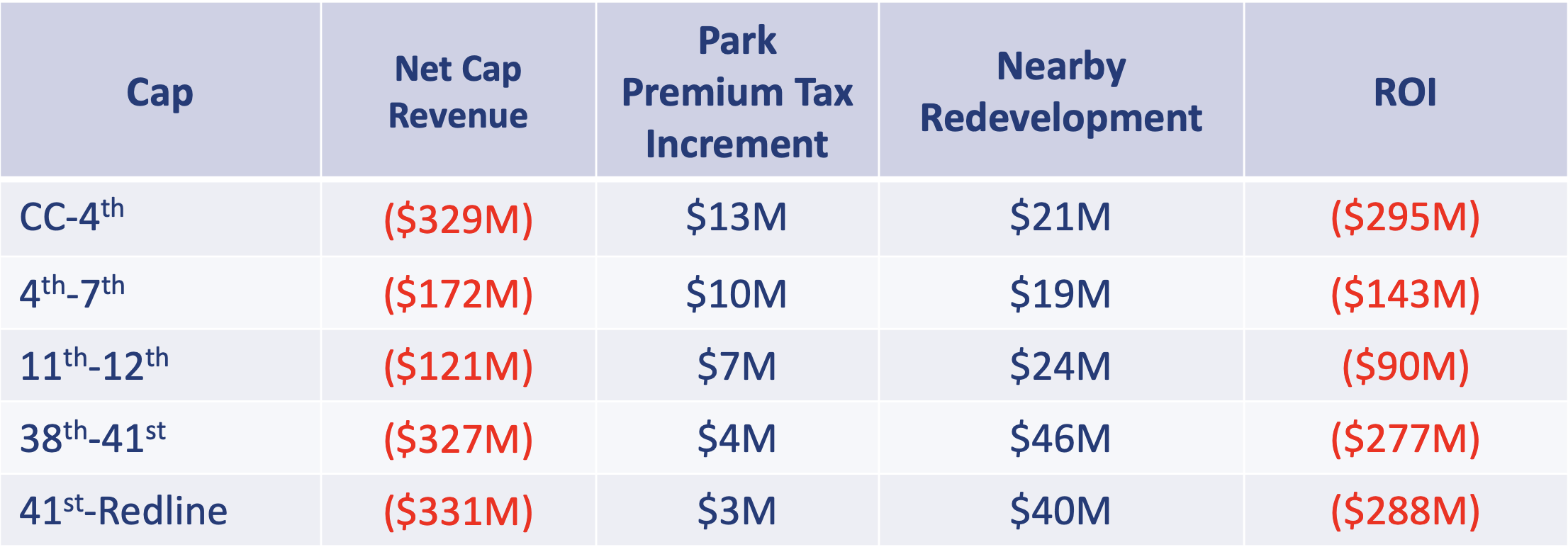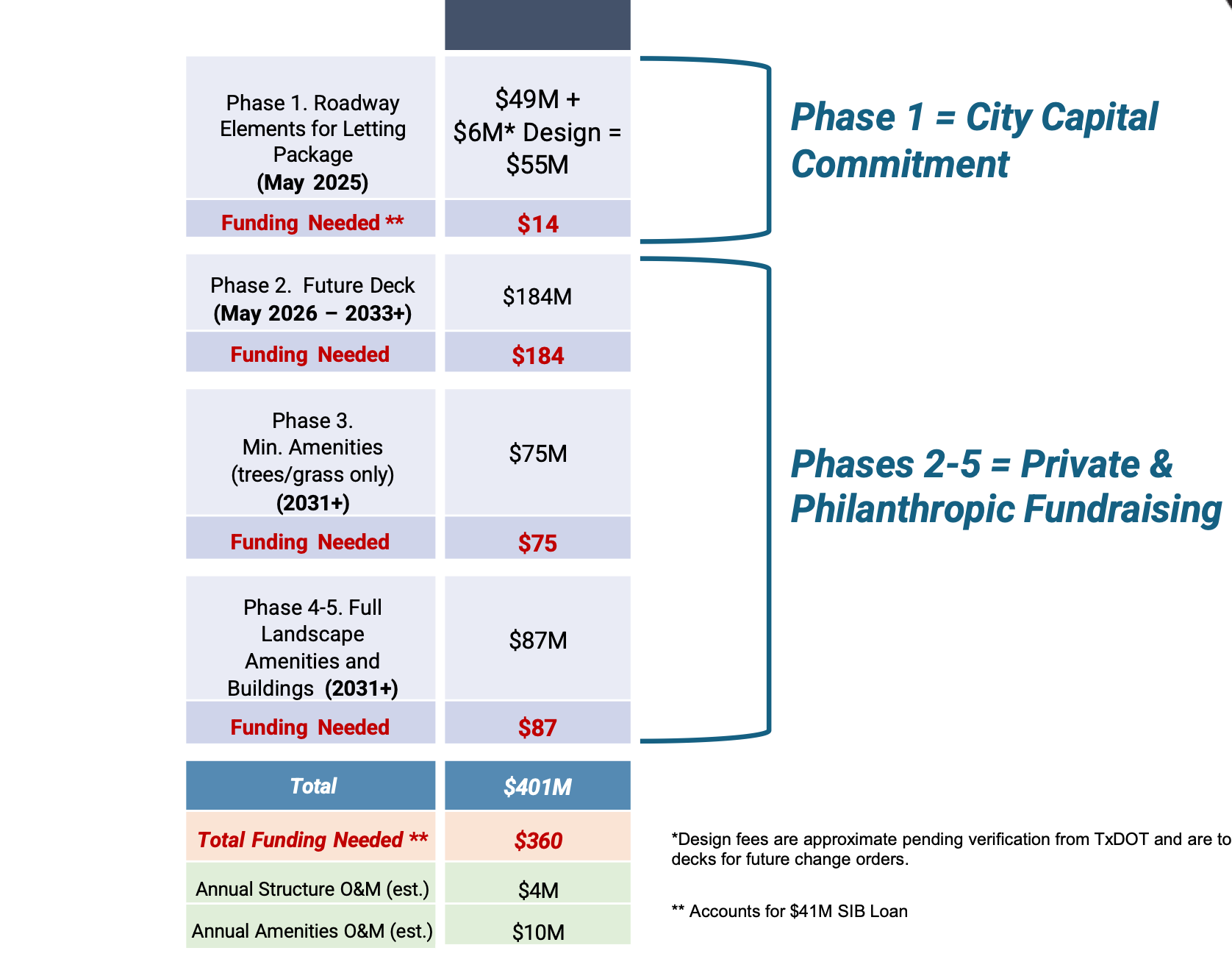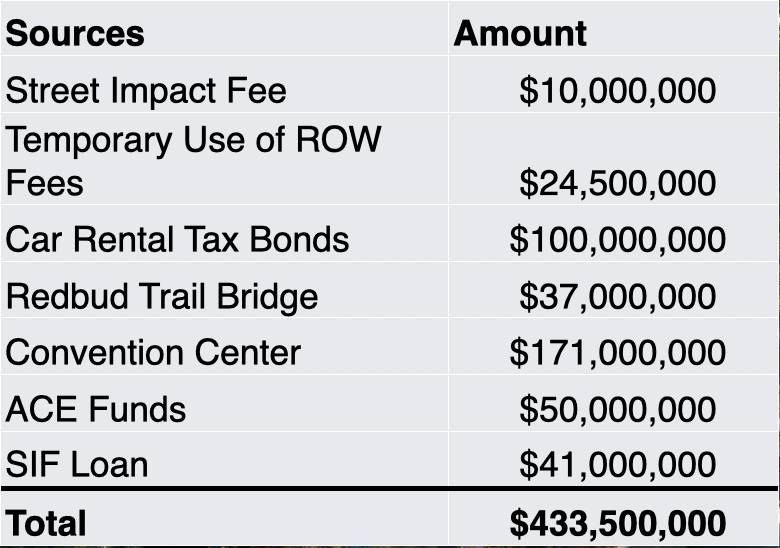A gloomy consultant report on I-35 caps
Skepticism is building.

City Council members today publicly digested a consultant report that flatly described the proposed caps on I-35 as a poor public investment.
The analysis by Hayat Brown, a national engineering and advisory firm that specializes on capital projects, concluded that the cost of the caps would far exceed the revenue they would generate through increased property valuations or commercial leases on the caps themselves.

The report came out a week after news that a $105 million federal grant the city had been counting on to help build the Cesar Chavez to 4th St cap would likely be clawed back by Republicans in Congress. It also comes when the legislature is considering a bill that would make it much harder for local governments to issue debt (certificates of obligation) without voter approval.
All of these considerations prompted city staff to significantly pare back its recommendation for the project. Its official recommendation is now for the city to commit to funding the foundational elements needed to build just two caps –– one from Cesar Chavez to 4th and one from 11th to 12th Streets.

The Hayat analysis highlighted key distinctions between other widely-lauded highway cap projects around the country and what is envisioned for I-35. For instance:
Other cap projects, such as Klyde Warren Park in Dallas or the Big Dig in Boston, benefited from an enormous amount of private investment and/or philanthropy, while no such money has been publicly identified in Austin.
The most valuable tracts near the downtown caps are already developed and unlikely to redevelop in the near future.
Many of the properties that are ripe for redevelopment are city-owned (e.g. APD headquarters). The city could pursue a policy of trying to maximize tax revenue from them by turning them over to the private sector, but that would conflict with past resolutions Council has passed that identifies them as priority locations for public uses, such as affordable housing, affordable child care and community services. There are other public entities that own large chunks of prime real estate –– Travis County has made clear that it will not allow the Palm School to be redeveloped into a skyscraper, for instance.
The city already has in place a Tax Increment Reinvestment Zone for the Waterloo Greenway, formerly known as the Waller Creek Chain of Parks, that covers much of the area near the downtown caps. This presents two issues. First, that massive city investment –– into the flood tunnel, creek restoration, the parks themselves –– has already helped spur redevelopment by opening up land that was previously at risk of flooding. Second, any increases in tax revenue in that district are committed to paying off the debt for the Waterloo Greenway through 2041.
City staff urges restraint
"The financial landscape has changed for us dramatically," said Kimberly Olivares, the city's deputy CFO. "We're really at a point now where the city covers the entire tab is not feasible any longer."
Assuming that Council goes forward with other planned investments (e.g. likely a big climate bond next year), adding this much new debt for the caps would likely trigger a credit score downgrade that would increase the city's borrowing costs.
Skeptics emboldened, supporters hold firm
It's still not entirely clear where the votes will fall because we have yet to hear from the mayor or Council Member Vanessa Fuentes. Watson didn't comment today and Fuentes was absent.
The following Council members appear to support committing to funding the structural elements for all of the caps: Chito Vela, Ryan Alter, Zo Qadri, Natasha Harper-Madison and Jose Velasquez. That's five –– one short of a majority.
The supporters have coalesced around an idea of committing to building the downtown caps during the I-35 expansion and funding construction of foundational elements for the two northern caps. Work on those actual caps, however, would not likely not start until at least the 2040's. They have argued that it's important to provide the elements now so that future Councils would have the option to provide the caps.
The following four Council members expressed strong skepticism of all or some of the caps: Paige Ellis, Mike Siegel, Krista Laine, Marc Duchen.
Vela acknowledged that the political and fiscal landscape is tough, but said that that might not always be the case. There may very likely be a time in decades to come, he said, when there might be a state or federal government "interested in capping freeways." If that happens, Austin will rue not making the necessary investments in the foundational elements to enable the northern caps.
"This is a decision we're going to live with for 100 years," he said.
Siegel agreed, but came to a very different conclusion.
"Every dollar we spend on this is a dollar we can't spend on other capital needs," said Siegel, who is against all of the caps. "We need to consider the whole city's needs, not just downtown or folks bordering the freeway."
There's also a big risk, said Siegel, that the caps will never be built at all. It's not a hard point to make these days, given the state of Project Connect or other city bond projects that have seemingly evaporated due to cost overruns.
"We're talking about putting a roof over a highway when we could be talking about putting roofs over thousands of people's heads," he said.
Laine, who represents far northwest Austin, similarly suggested that she could not ask taxpayers to shoulder such a heavy burden for a project with questionable citywide impact.
"Our risks are so great and the challenges to our communities are so significant," she said. "I really want the city to have the flexibility to support the people in it."
Harper-Madison and Velasquez, both native East Austinites, stressed the importance of bridging the historic racial and socioeconomic divide created by the highway.
"For me this is about healing a scar that I've lived through," said Velasquez.
Behind the scenes, supporters of the caps expressed frustration with the consultant report, saying that it was judging the proposed park caps as merely economic development tools instead of as public spaces that will offer intrinsic community benefits.
Harper-Madison's secret donors
Harper-Madison's comments deserve their own section. Speaking remotely, the District 1 Council member launched into an impassioned recounting of the damage to Black and Hispanic communities by city-sanctioned segregation, damage that "we can never pay back."
Most notably, she disputed the notion that there was no private money available for the projects.
"We've been offered private dollars on multiple occasions," she said, without specifying from w
Reached by phone later, Harper-Madison was cryptic and unconvincing. She said that Eureka Holdings, the secretive real estate company that has bought up much of E. 12th St., had talked about building caps across the highway and that she had talked to staff about setting up a GoFundMe-style portal where people could contribute to city projects, including the highway caps.
Alternative funding sources
The sub-quorum of staunch caps supporters (Vela, Velasquez, Alter, Qadri) came up with a list of potential revenue sources that could help pay for the caps without authorizing more debt.
The biggest idea is using $171 million of hotel tax revenue for the Convention Center expansion. The 2% additional hotel tax that City Council authorized to fund the expansion in 2019 can only be used for the expansion, but these Council members argue that the Cesar Chavez to 4th St cap could be described as part of the expansion and host some Convention Center programming. Umm...OK? Apparently the Convention Center staff are OK with it, which I suppose means the hotel industry, which the department always seems to agree with, is also OK with it too.
They also proposed $50M from another fund linked to the Convention Center.
The second big item is the rental car tax. I hate to admit it, but I didn't even realize we had a rental car tax –– right now it is dedicated to paying off debt for the Palmer Event Center. After it is paid off in 2029, however, voters will have a chance to designate the tax to something else. This group is proposing devoting $100M of revenue to the caps.
The group also proposed scrapping plans to rebuild the Redbud Trail Bridge ($37M), increasing fees charged to private events for using public streets ($24.5M) and drawing on $10M of street impact fees collected from projects near the highway.

The money raised from these sources would cover the estimated cost of the structural elements for all of the proposed caps to the Redline as well the Cesar-4th and 4th-7th caps themselves.
Paige Ellis, however, made clear that she was not interested in taking money from the Redbud Trail Bridge, which is in her district. The bridge is a key route for Austin Water trucks traveling to the nearby treatment plant. Simply giving up on the project would be a serious dereliction of duty for the city's infrastructure, she suggested.
"I have a huge concern with reallocating funds that have already been promised to the public," she said.
She also cast doubt on the ability to use Street Impact Fees –– state law restricts their use to expanding roadway capacity.
My reaction to all of these potential funding sources, particularly the car rental tax was, "Wow. We could use that on a lot of other cool stuff!"
Where's Watson? It's his mess
Amidst some of the dubious claims made in Harper-Madison's rant was an undeniable truth: "We got talked into and forced into a bigger and wider highway."
Indeed. And no person is more responsible for that than Mayor Kirk Watson, who as state senator pushed for TxDOT funding for an I-35 expansion. He used to talk about it a lot, now not so much. I wish others would talk about it, though. This expansion is a bad idea, and these caps are not nearly enough to mitigate the harm it will do.
If I had to guess, I think Council will go with staff's recommendation, approving the two downtown caps but not the others. But we'll see.
If somebody forwarded you this email, please consider subscribing to the newsletter by visiting the website.





